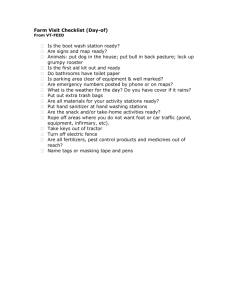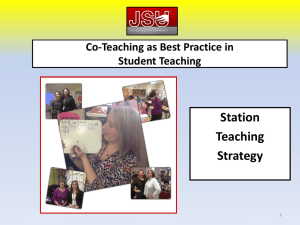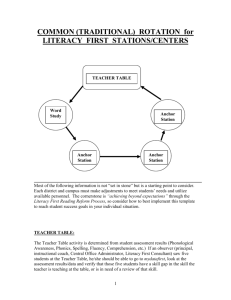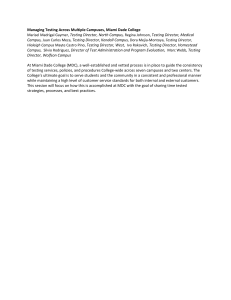2011 Application Submission
advertisement
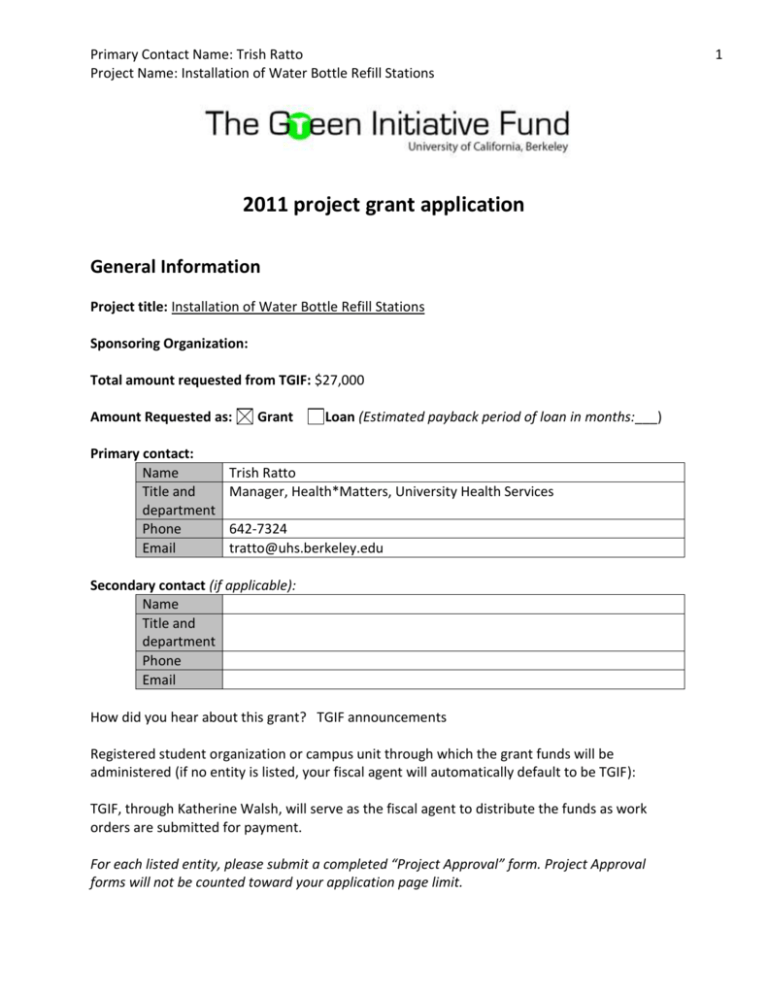
Primary Contact Name: Trish Ratto Project Name: Installation of Water Bottle Refill Stations 2011 project grant application General Information Project title: Installation of Water Bottle Refill Stations Sponsoring Organization: Total amount requested from TGIF: $27,000 Amount Requested as: Primary contact: Name Title and department Phone Email Grant Loan (Estimated payback period of loan in months:___) Trish Ratto Manager, Health*Matters, University Health Services 642-7324 tratto@uhs.berkeley.edu Secondary contact (if applicable): Name Title and department Phone Email How did you hear about this grant? TGIF announcements Registered student organization or campus unit through which the grant funds will be administered (if no entity is listed, your fiscal agent will automatically default to be TGIF): TGIF, through Katherine Walsh, will serve as the fiscal agent to distribute the funds as work orders are submitted for payment. For each listed entity, please submit a completed “Project Approval” form. Project Approval forms will not be counted toward your application page limit. 1 Primary Contact Name: Trish Ratto Project Name: Installation of Water Bottle Refill Stations Project Description 1. Please give a brief history of this project/your organization. Describe the overall purpose (goals) of the project. The goal of this project is to improve access to tap water to support the use of reusable drinking containers and reduce the purchase and disposal of single-use plastic water bottles. In 2006 there were over 840,000 single-use plastic water bottles sold on campus. The analysis of beverage sales for 2010 shows a 48% decline in water bottle sales, or 430,630 bottles. This is a significant decline and a successful indicator of campus initiatives such as The I Heart Tap Water campaign, as well as the commitment of students to bring their refillable containers to campus. However, this analysis also shows over 400,000 single-use plastic water bottles are still being purchased on campus, in addition to any plastic bottles being brought to campus after being purchased elsewhere. This equates to at least 14,000 pounds of plastic waste, only about 1/3 of which will be recycled with the rest entering the waste stream or littering our community. As bottled water sales decrease on campus, it is more important than ever to ensure the campus has access to tap water and refill stations to support this downward trend. A 2007 survey of students found 60% felt that the campus lacks adequate sources for refilling reusable water containers. Many campus groups have worked collaboratively to educate the campus about tap water use and plastic water bottle waste. Improving access to water bottle refill stations will help to foster a sustainable campus culture. This project intends to improve access to tap water by installing four to five water bottle refill stations around campus. This will improve the campus infrastructure for access to tap water and make it easier for the campus community to refill their reusable bottles. The Dwinelle Hall refill station, funded by a 2010 TGIF grant as part of developing the Design Standard for Refill Stations and installed in January 2011, has already reduced the equivalent of over 11,700 bottles from going into the landfill. 2. What will be the process for implementing your project? Describe the key components and steps of your project. This proposal builds on the 2010 TGIF grant which funded the development of the Design Guidelines for Installation of Hydration Stations in Existing Buildings. With the new Design Guidelines, consultation with Physical Plant-Campus Services, and lessons learned from the installation of the Elkay Refill Station in Dwinelle Hall, criteria to determine the locations for installing more refill stations has been identified. These criteria include: Compliance with the Design Guidelines for existing Hi/Low water fountains Preference for the lowest cost installation (plumbing only, no construction and minimal electrical work, if needed) Areas with high student traffic With these criteria, an assessment was completed of 20 buildings. Several locations emerged as the best match to the criteria and four have been approved by the Building/Facility Manager for installation of water refill stations. The buildings are Evans Hall, Stanley Hall, Boalt Hall, and University Hall. To not add any additional overhead costs, University Health Services, through the Project Lead, Trish Ratto, will 2 Primary Contact Name: Trish Ratto Project Name: Installation of Water Bottle Refill Stations hold and distribute the funds to the building managers upon completion of the work orders. The building managers have approved this plan, and have agreed to coordinate installation following the Design Guidelines. If all the funds are not used for these four installations, we would like to explore the options to retrofit certain types of water fountains with “glass fillers” that can be used to fill water bottles, identify more buildings for refill stations, and/or add permanent sign holders to include I Heart Tap Water posters near the refill stations. 3. Which aspects of campus sustainability will your project address, and why is addressing these sustainability components important? How will your project benefit the UC Berkeley campus community as a whole? This project addresses the following sustainability components as categorized by the 2009 Campus Sustainability Plan: Waste – Implementation of this project will reduce the amount of solid waste generated on campus and in the community by reducing the number of plastic drinking water bottles disposed of in the trash. Energy – The reduction in demand for plastic water bottles on campus will contribute to a decrease in raw materials and energy usage required to produce, distribute, recycle, and refrigerate water bottles. 4. Does your project tie into any broader campus sustainability initiatives? If so, how? This project ties into the following campus sustainability initiatives: I Heart Tap Water collaborative campaign between Cal Dining, Environment, Health & Safety, Recreational Sports and University Health Services addressing health and sustainability by promoting the message to drink tap water, reduce the purchase of plastic water bottles and use a refillable container. Building Sustainability@Cal, a group of students working to improve sustainable practices in buildings and departments. UCB Nutrition and Physical Activity Work Group’s goal to improve access to tap water for refilling reusable water containers. 2020 Long Range Development Plan (Sustainable Campus -- Section 3.1.11 draft), which includes a policy calling for “minimizing the use of nonrenewable energy and material resources.” 2020 Campus Sustainability goal of zero waste. Project Approvals (Projects will not be considered without the relevant approvals). 5. Do any aspects of your project require approval from an entity on or off campus? If so, please explain. (For example, a project which affects campus grounds or buildings must be approved by the Vice Chancellor for Facilities Services) For each listed entity, please submit 3 Primary Contact Name: Trish Ratto Project Name: Installation of Water Bottle Refill Stations a completed “Project Approval” form. Project Approval forms will not be counted toward your application page limit. Trish Ratto, Health*Matters Manager, has approved UHS’ role to manage the TGIF funds, coordinate with the building managers for the installations, and work with I Heart Tap Water partners on publicity and outreach of the new bottle refill stations. It is hoped that this model will eliminate the potential for additional overhead costs because the Design Guidelines are completed, the building locations have been identified and approved, and the building managers have agreed to manage the installations directly with either PP-CS or Facilities for L&S. Nick Pigati, Head Plumber with PP-CS, has reviewed the building and installation locations and agrees these sites are the lowest cost installation and they meet the Design Guidelines. PP-CS will respond to the work orders for the installation at their recharge rate. Brian Joseph, Director of Facilities for L&S, has a small team of plumbers and contractors, and is interested in bidding on this work at their recharge rate. Building Managers: Evans Hall: approved by Ruben Mejia, Facilities Manager Stanley Hall: approved by Stewart Brown, Building Manager Boalt Hall: approved by Lisa Ferrari, Building Manager University Hall: approved by Janis Honda, Building Manager Metrics and Measurability 6. What quantifiable sustainability impacts will your project have and what will be the cost savings to the campus? How do these impacts fit into the larger campus context (For example, what fraction of campus electricity use does your savings represent)? Please use the CalCAP Statistics spreadsheet in your calculations and submit it separately from your application. The 2009 Campus Sustainability Assessment contains additional information on campus resource usage. Implementation of this project is expected to have measureable impacts on waste, energy and purchases of plastic water bottles. We expect that access to water refilling stations on campus will continue to reduce the sales of bottled water on campus, thus decreasing waste and the associated energy costs. Quantifiable measures that can help determine the impact of the refill stations include analysis of bottled water sales and the number of single-use plastic bottles saved from the landfill measured by every 12 ounces used to fill a container at the refill stations. The two primary models of refill stations that meet the Design Guidelines come with a counter showing the number of disposable bottles saved from the landfill. In 2005-06, sales of bottled water equaled 35,173 cases. In 2008-09, the first year of the I Heart Tap Water campaign, water sales dropped to 21,986 cases. This decline of approximately 38% equates to 4 Primary Contact Name: Trish Ratto Project Name: Installation of Water Bottle Refill Stations 316,488 single-use disposable, plastic water bottles prevented from becoming thousands of pounds of plastic bottles entering the waste stream. The decrease in water bottle sales has continued in 2009-10, dropping to 17,943 cases, primarily declining in retail operations, while vending sales have remained essentially unchanged. We expect to see further reductions in these numbers with an increased investment in bottle refill stations in new and existing campus buildings for easier refilling of water containers. 7. How will you measure these impacts after your project is implemented in order to see if you have met your goal? In addition to TGIF, who will you report your information to? This project will determine the reduction in campus waste using the refill stations counters showing the number of disposable bottles saved from the landfill. This project will report on increased awareness of refill stations and the likelihood to bring a refillable container to campus. This will be assessed in coordination with the I Heart Tap Water by adding questions to the online pledge and questionnaire. In addition to TGIF, the measurable results will be provided to the Office of Sustainability, Capital Projects, UCB Nutrition and Physical Activity Work Group, and campus leadership to report cost savings and waste reduction, and to support continued installation of refill stations and/or retrofits to water fountains in existing campus buildings. Through the leadership of Capital Projects over the last year, new campus buildings have included refill stations in the design. To date, these include LiKa-Shing, Boalt In-fill Project, the Blum Center, and the Athletic Performance Center. 8. How does your project go above and beyond the requirements already mandated by UC Berkeley and/or state law? Water bottle refill stations are not required by any state or federal law, nor are they required by any specific UC Berkeley policy or mandate. An initiative to request the end of all bottled water sales on the UC Berkeley campus may be on the ASUC ballot this April. Some concerns that students have expressed around drinking fountains include: the inability to use a water fountain to refill a reusable container, poor functioning water fountains, cleanliness of water fountains, and safety of the water from water fountains. This project would help to alleviate many of these student concerns, and provide students with improved access to tap water for filling a reusable container on campus. Project Team 9. Please identify the project manager(s) as well as the member of the team (liaison) responsible for reporting project status and success in the following tables (each project will be expected to report regularly to the TGIF Coordinator with frequency based on the scale of the project). For each entity listed, please submit a completed “Project Approval” form. If you want to list additional team members, please add the entries to the end of the application. Additional team member information will not count toward your page limit. 5 Primary Contact Name: Trish Ratto Project Name: Installation of Water Bottle Refill Stations Name Title and department Project Role Phone Email Relevant experience or knowledge for this project Trish Ratto Manager, Health*Matters, University Health Services Name Title and department Phone Email Relevant experience or knowledge for this project Nick Pigati Lead Plumber, Physical Plant-Campus Services Name Title and department Phone Email Relevant experience or knowledge for this project Brian Joseph Director of Facilities for L&S Coordination with Building Managers, Plumbers, L&S Facilities, and TGIF (510) 642-7324 tratto@uhs.berkeley.edu Trish has been a member of the I Heart Tap Water team, and helped to facilitate the 2010 TGIF grant on the Design Guidelines for Installation of Hydration Stations in Existing Buildings. She serves as Chair of the UB Nutrition and Physical Activity Workgroup that is working to improve access to healthier food and beverage options on campus, including tap water. Trish does not have a recharge rate for her time, which has helped to not have an additional cost to facilitate planning, approvals and identification of the locations for refill stations. (510) 643-6594 Pigati@berkeley.edu Nick’s team of plumbers has already installed the HAWS Hydration Station in Wurster Hall. They have reviewed the locations identified to get refill stations and determined an approximate cost per installation. 510 643-9934 bjoseph@berkeley.edu Brian and his facilities team primarily serve to complete small construction projects for L&S. They would like an opportunity to assist with this project and bid on the work at their recharge rate. 10. If your project team is partnering with other organizations, departments, individuals, or other stakeholders, please explain their involvement and include their contact information. For each listed entity, please submit a completed “Project Approval” form. Project Approval forms will not be counted toward your application page limit. 6 Primary Contact Name: Trish Ratto Project Name: Installation of Water Bottle Refill Stations The Building Managers are excited about the possibility of their building getting a refill station and they are willing to coordinate the work order and payment process. Evans Hall: approved by Ruben Mejia, Facilities Manager Stanley Hall: approved by Stewart Brown,, Building Manager Boalt Hall: approved by Lisa Ferrari, Building Manager University Hall: approved by Janis Honda, Building Manager 11. Please be specific about the ways in which you can ensure that your team will have time available to work on this project. (For example, students might choose to take fewer classes in order to have time to devote to the project. Staff might receive permission from a supervisor to devote X hours per week to the project). The preliminary work has been completed – the Design Guidelines, the location of buildings that match the criteria (described previously), the approvals by the building managers and the engagement of PPCS and L&S Facilities Team. The majority of the work will now be completed by the Building Managers and either Physical PlantCampus Services or Facilities for L&S team. 12. How much of your project will students be involved in? What roles will students play in your project? Does your project target involvement of a certain section of the student body? Student involvement will primarily include outreach and promotion of the new refill stations in various student publications and social media outlets. We also anticipate that student word of mouth will play a significant role in promotion of refill stations. Project Education, Outreach, and Publicity Plan Note: This section is about letting the campus know what your project has accomplished after you’ve met your project goals. If outreach and education are the primary goals of your project, please describe them above in the section entitled “Project Goals and Quantifiable Impacts.” 13. What is your plan for publicizing your project on campus? To educate and inform the campus community about the new refill stations, publicity and outreach will be coordinated with the assistance of the I Heart Tap Water Campaign. University Health Services (UHS) is committed to coordinating this outreach. The new refill stations will be added to the Water Refill Station locater map, which sits on the I Heart Tap Water web page. 7 Primary Contact Name: Trish Ratto Project Name: Installation of Water Bottle Refill Stations 8 Articles will be provided to campus publications (the Daily Cal, Berkeleyan Online, Bright Green News) to help promote the new refill stations. Outreach will also be conducted at campus events such as Welcome Week, Caltopia, PLAYgreen, tabling at Sproul Plaza, and special events held during Earth Week. 14. Do you have any specific outreach goals? If so, how will they be measured? Outreach and awareness of refill stations will be determined through the I Heart Tap Water campaign. This program hopes to see an increase in the number of I Heart Tap Water pledges with at least 25% of new pledges being familiar with refill stations on campus, as well as a 10% increase in web traffic to the Bottle Refill Station locater map. Budget 15. List all budget items for which funding is being requested under the appropriate category. Include cost and total amount for each item requested. Please be as detailed as possible. (Insert additional rows if necessary). If you have price quotes from vendors or additional historical budget information for projects that have occurred previously or are on-going, please submit those with this application. Additional budget documentation will not be counted toward your application page limit. Item Cost per Item Quantity Total Request 4-5 22,000 5,000 Equipment and Construction Costs Cost of the Bottle Refill Stations, plus installation 4-5,000 An additional installation of refill stations, bottle filler retrofits on fountains, permanent sign holders and/or contingency fund for unforeseen problems TOTAL $27,000 16. If your project is implemented, does is require any on-going funding after its completion? What is your strategy for supporting the project after this initial period to cover replacement, operational, and renewal costs? (Note: TGIF is unlikely to provide funding beyond the initial year for ongoing projects). This project is not requesting on-going funding for this specific project year. Once these new refill stations are installed; we may apply for a 2012 TGIF grant to fund more refill stations. Maintenance associated with the bottle refill stations will be covered by Physical Plant-Campus Services. Primary Contact Name: Trish Ratto Project Name: Installation of Water Bottle Refill Stations 9 17. List all non-TGIF sources you are pursuing for funding, volunteer time, in-kind donations, etc. Source/Description Amount Date Request submitted Project lead – Manage the TGIF funds, coordinate approvals and installations with building managers. Assessment of 20 potential locations for low-cost installation and meetings with the plumbers already completed. Project management of the installations by the building managers. Date received / date funding will be announced In-kind In-kind Coordination of publicity by campus departments involved with assistance from student volunteers Written outreach materials Electronic Outreach In-Kind In-Kind In-Kind Project Timeline 18. Please complete the following table to describe your project timeline. List milestones chronologically. For the “Timeframe” column, please estimate how long each task will take to be completed. (Insert additional rows if necessary). Each one of the following items must be included on your timeline: Project start date Target date for project completion Date by which you will need the first installment of TGIF money Date by which you expect to have spent all TGIF funds Target date for submitting final project report to TGIF Any significant tasks or milestones along the way (For example: identifying an equipment vendor, begin installing equipment, finish installing equipment, etc.) Task Project Start Date: June 1 Once this TGIF proposal is approved (based on June 1 date or as soon as the funds are received); hold meeting with all the project managers to distribute work order template, and review the models Timeframe (# of wks to completion) 4 weeks Estimated completion date June 30 Primary Contact Name: Trish Ratto Project Name: Installation of Water Bottle Refill Stations of refill stations that match each specific location. The work of identifying the right refill station model, the building locations, and approvals has already been completed in preparation for submitting this proposal Building managers to proceed with submitting work orders Installation work to be completed Distribution of the TGIF funds will begin after June 30 and continue through completion, estimated at Aug 30 Target Date for Completion of Installation This would be ideal to be completed at the beginning of the Fall 2011 semester. Target date for submission of budget report following installations Target date for submission of final TGIF report to include all measurable results 10 4 weeks 8 weeks July 1 Aug 30 12 weeks Aug 30 Aug 30 3 months Dec 1 April 30. 2012


